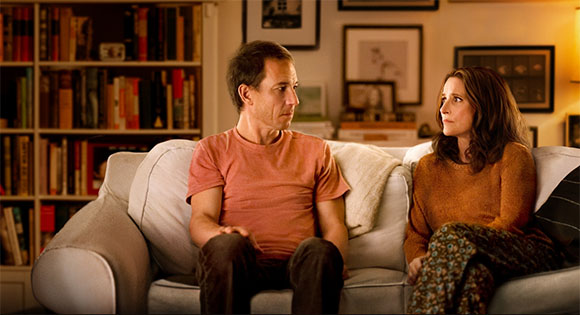In Daring to Trust: Opening Ourselves to Real Love & Intimacy, psychotherapist David Richo writes about the lack of trust in today’s world. He explores “a reliance on reliability” as the core issue at the heart of all relationships:
“This quality is undermined when someone is unfaithful to us; deceives us; cheats us; lies to us; disappoints us; doesn’t come through for us; or deliberately demeans or hurts us.”
A major source of societal troubles is that many people grew up in families where mistrust was rampant. Children learned that adults did not keep their word and were capable of betrayal on many levels. As a result, they are unable to trust anyone, including themselves.
Richo continues: "The opposite of interpersonal trust is not mistrust. It is despair. This is because we have given up on believing that trustworthiness and fulfillment are possible from others. We have lost our hope in our fellow beings."

Trust and challenges to it are themes of You Hurt My Feelings. Beth (Julia Louis-Dreyfus) is a part-time writing teacher and the author of a memoir. She is the wife of Don (Tobias Menzies), a therapist, and mother to Eliot (Owen Teague) who works as a clerk in a weed store. Beth is close to her sister Sarah (Michaela Watkins), a salesperson in a store that caters to the rich. Her husband Mark (Arian Moayed) is an actor.
All the older characters are seeking pleasure and fulfillment through creativity. But middle age has slowed them down and the praise they seek has not been forthcoming. Don laments the criticism of an unhappily married couple (Amber Tamblyn and David Cross) and is shocked when they ask for a refund. And Mark, the actor, feels sorry for himself: “I’m tired of wanting validation and never getting it.”
The one person whose feelings are hurt the most is Beth. For years Don has praised her writing and she has used his comments as fuel as she tries to complete a novel. However, when she secretly hears him criticizing her writing, she is plunged into a pit of self-pity, anger, and loss. He has not been honest with her and now she can’t trust what he says. What the others describe as a little white lie, she regards as a major betrayal.
Karla McLaren, an empathetic healer, has rightly observed: “Emotions are the richest source of energy we possess.” Many of our favorite spiritual masters emphasize the healing, nurturing, and uplifting power of positive emotions such as love, joy, enthusiasm, gratitude, compassion, peace, unity, and wonder. These emotions serve as soul boosters and enable us to cope with the messes and miseries of life.
Self-help therapists tell us to pay attention to what our emotions are telling us and to work with them. Spiritual leaders ask us to go a step further. They suggest that we also recognize that even negative emotions we find toxic and troubling, such as anger, hatred, fear, and shame, can be a catalyst to our transformation.
These principles of emotional intelligence are good to keep in mind as you reflect on what the characters go through in You Hurt My Feelings. This is the seventh film by writer and director Nicole Holofcener to deal with emotional intelligence. Here are the others:
Walking and Talking, a funny and fetching drama about friendship between women.
Lovely & Amazing, an endearing portrait of two oddball sisters and their vulnerable mother.
Friends with Money, a relaxed and realistic look at four women dealing with the fallout from middle age.
Please Give, a terrific film about guilt as the guardian of our goodness and a sign of our yearning to belong to the larger world.
Enough Said, a comedy that proves that succeeding in an intimate relationship after divorce takes the patient kindness of a saint.
The Land of Steady Habits, an engaging drama about the steep challenges of middle-age and suburban living.
